Event Analysis: Oktoberfest - Impacts, Tourism, and Social Dimensions
VerifiedAdded on 2022/11/16
|6
|2188
|457
Report
AI Summary
This report provides a comprehensive analysis of the Oktoberfest event, examining its origins, scope, and significant impacts on tourism and social dimensions. The report highlights the positive economic benefits of tourism, such as increased revenue and employment, while also acknowledging the negative consequences, including overcrowding and environmental pollution. The social impact of Oktoberfest is discussed, emphasizing both the sense of community and the challenges faced by local residents. The report also explores various management strategies implemented to mitigate negative impacts, such as online reservations and cleaning initiatives, and provides recommendations for future practices to reduce negative impacts and increase positive outcomes, focusing on early bookings, encouraging weekday attendance, and improving infrastructure. The analysis concludes by emphasizing the importance of balancing the economic benefits of the event with the well-being of the local community and the environment.
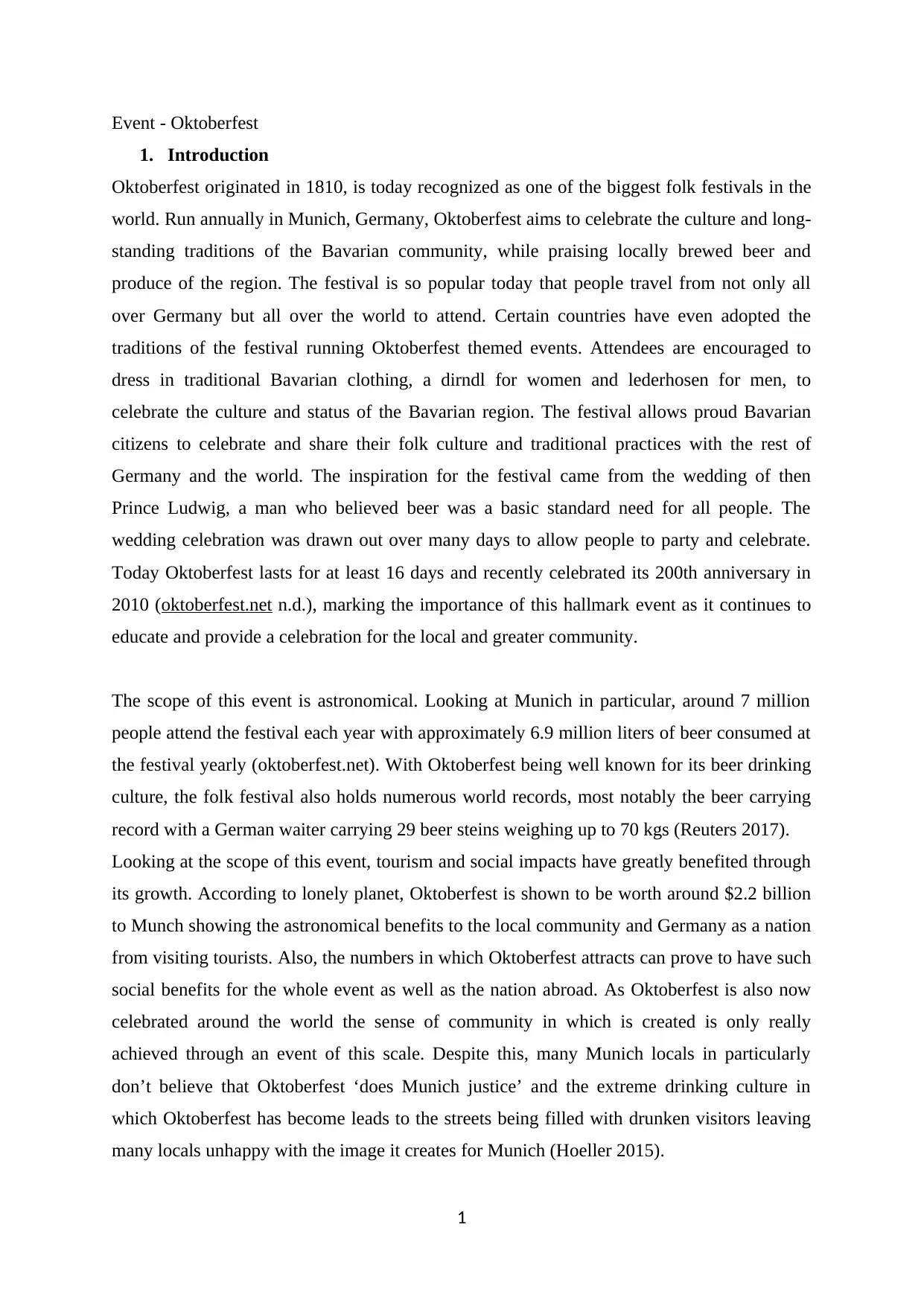
Event - Oktoberfest
1. Introduction
Oktoberfest originated in 1810, is today recognized as one of the biggest folk festivals in the
world. Run annually in Munich, Germany, Oktoberfest aims to celebrate the culture and long-
standing traditions of the Bavarian community, while praising locally brewed beer and
produce of the region. The festival is so popular today that people travel from not only all
over Germany but all over the world to attend. Certain countries have even adopted the
traditions of the festival running Oktoberfest themed events. Attendees are encouraged to
dress in traditional Bavarian clothing, a dirndl for women and lederhosen for men, to
celebrate the culture and status of the Bavarian region. The festival allows proud Bavarian
citizens to celebrate and share their folk culture and traditional practices with the rest of
Germany and the world. The inspiration for the festival came from the wedding of then
Prince Ludwig, a man who believed beer was a basic standard need for all people. The
wedding celebration was drawn out over many days to allow people to party and celebrate.
Today Oktoberfest lasts for at least 16 days and recently celebrated its 200th anniversary in
2010 (oktoberfest.net n.d.), marking the importance of this hallmark event as it continues to
educate and provide a celebration for the local and greater community.
The scope of this event is astronomical. Looking at Munich in particular, around 7 million
people attend the festival each year with approximately 6.9 million liters of beer consumed at
the festival yearly (oktoberfest.net). With Oktoberfest being well known for its beer drinking
culture, the folk festival also holds numerous world records, most notably the beer carrying
record with a German waiter carrying 29 beer steins weighing up to 70 kgs (Reuters 2017).
Looking at the scope of this event, tourism and social impacts have greatly benefited through
its growth. According to lonely planet, Oktoberfest is shown to be worth around $2.2 billion
to Munch showing the astronomical benefits to the local community and Germany as a nation
from visiting tourists. Also, the numbers in which Oktoberfest attracts can prove to have such
social benefits for the whole event as well as the nation abroad. As Oktoberfest is also now
celebrated around the world the sense of community in which is created is only really
achieved through an event of this scale. Despite this, many Munich locals in particularly
don’t believe that Oktoberfest ‘does Munich justice’ and the extreme drinking culture in
which Oktoberfest has become leads to the streets being filled with drunken visitors leaving
many locals unhappy with the image it creates for Munich (Hoeller 2015).
1
1. Introduction
Oktoberfest originated in 1810, is today recognized as one of the biggest folk festivals in the
world. Run annually in Munich, Germany, Oktoberfest aims to celebrate the culture and long-
standing traditions of the Bavarian community, while praising locally brewed beer and
produce of the region. The festival is so popular today that people travel from not only all
over Germany but all over the world to attend. Certain countries have even adopted the
traditions of the festival running Oktoberfest themed events. Attendees are encouraged to
dress in traditional Bavarian clothing, a dirndl for women and lederhosen for men, to
celebrate the culture and status of the Bavarian region. The festival allows proud Bavarian
citizens to celebrate and share their folk culture and traditional practices with the rest of
Germany and the world. The inspiration for the festival came from the wedding of then
Prince Ludwig, a man who believed beer was a basic standard need for all people. The
wedding celebration was drawn out over many days to allow people to party and celebrate.
Today Oktoberfest lasts for at least 16 days and recently celebrated its 200th anniversary in
2010 (oktoberfest.net n.d.), marking the importance of this hallmark event as it continues to
educate and provide a celebration for the local and greater community.
The scope of this event is astronomical. Looking at Munich in particular, around 7 million
people attend the festival each year with approximately 6.9 million liters of beer consumed at
the festival yearly (oktoberfest.net). With Oktoberfest being well known for its beer drinking
culture, the folk festival also holds numerous world records, most notably the beer carrying
record with a German waiter carrying 29 beer steins weighing up to 70 kgs (Reuters 2017).
Looking at the scope of this event, tourism and social impacts have greatly benefited through
its growth. According to lonely planet, Oktoberfest is shown to be worth around $2.2 billion
to Munch showing the astronomical benefits to the local community and Germany as a nation
from visiting tourists. Also, the numbers in which Oktoberfest attracts can prove to have such
social benefits for the whole event as well as the nation abroad. As Oktoberfest is also now
celebrated around the world the sense of community in which is created is only really
achieved through an event of this scale. Despite this, many Munich locals in particularly
don’t believe that Oktoberfest ‘does Munich justice’ and the extreme drinking culture in
which Oktoberfest has become leads to the streets being filled with drunken visitors leaving
many locals unhappy with the image it creates for Munich (Hoeller 2015).
1
Paraphrase This Document
Need a fresh take? Get an instant paraphrase of this document with our AI Paraphraser
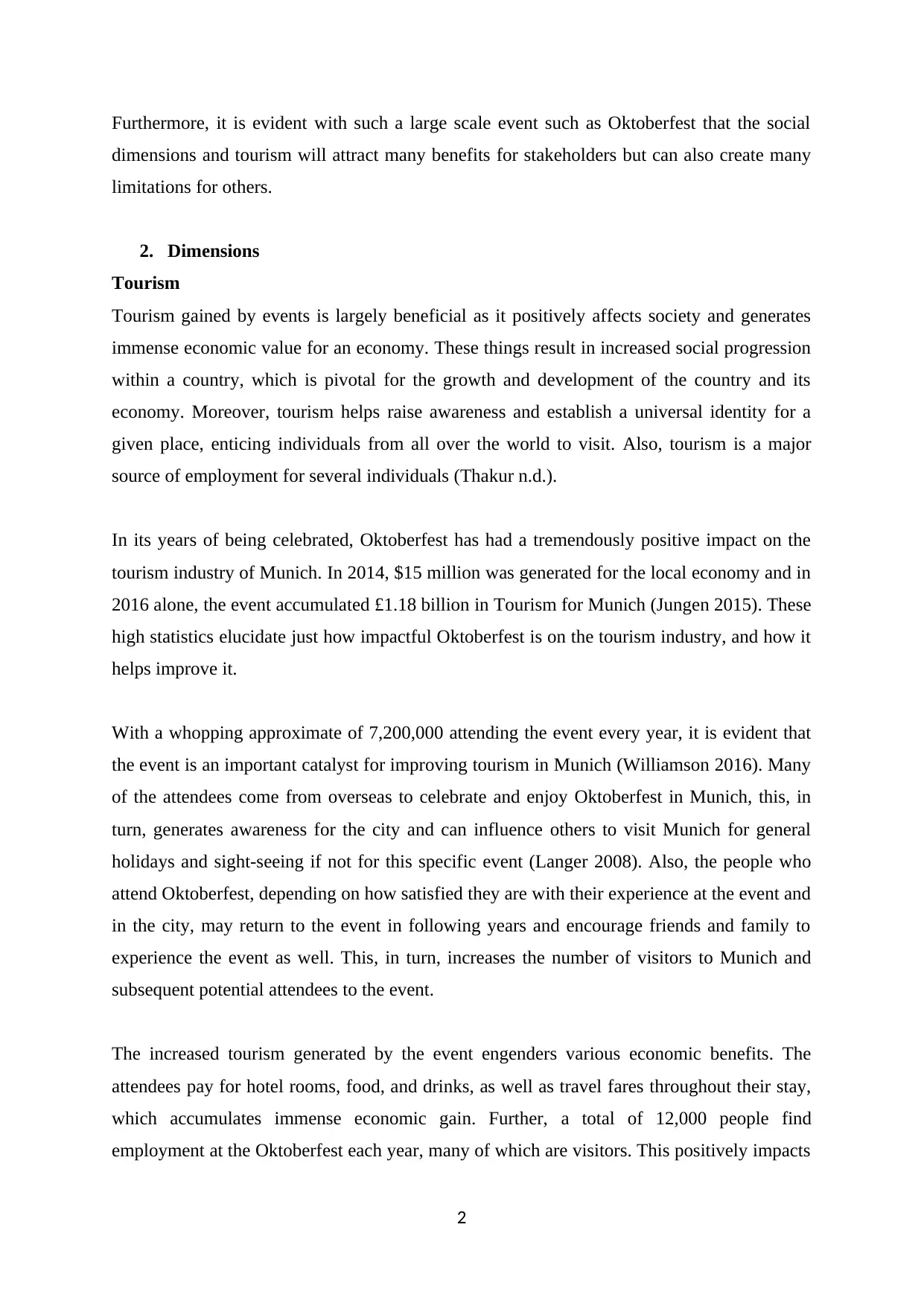
Furthermore, it is evident with such a large scale event such as Oktoberfest that the social
dimensions and tourism will attract many benefits for stakeholders but can also create many
limitations for others.
2. Dimensions
Tourism
Tourism gained by events is largely beneficial as it positively affects society and generates
immense economic value for an economy. These things result in increased social progression
within a country, which is pivotal for the growth and development of the country and its
economy. Moreover, tourism helps raise awareness and establish a universal identity for a
given place, enticing individuals from all over the world to visit. Also, tourism is a major
source of employment for several individuals (Thakur n.d.).
In its years of being celebrated, Oktoberfest has had a tremendously positive impact on the
tourism industry of Munich. In 2014, $15 million was generated for the local economy and in
2016 alone, the event accumulated £1.18 billion in Tourism for Munich (Jungen 2015). These
high statistics elucidate just how impactful Oktoberfest is on the tourism industry, and how it
helps improve it.
With a whopping approximate of 7,200,000 attending the event every year, it is evident that
the event is an important catalyst for improving tourism in Munich (Williamson 2016). Many
of the attendees come from overseas to celebrate and enjoy Oktoberfest in Munich, this, in
turn, generates awareness for the city and can influence others to visit Munich for general
holidays and sight-seeing if not for this specific event (Langer 2008). Also, the people who
attend Oktoberfest, depending on how satisfied they are with their experience at the event and
in the city, may return to the event in following years and encourage friends and family to
experience the event as well. This, in turn, increases the number of visitors to Munich and
subsequent potential attendees to the event.
The increased tourism generated by the event engenders various economic benefits. The
attendees pay for hotel rooms, food, and drinks, as well as travel fares throughout their stay,
which accumulates immense economic gain. Further, a total of 12,000 people find
employment at the Oktoberfest each year, many of which are visitors. This positively impacts
2
dimensions and tourism will attract many benefits for stakeholders but can also create many
limitations for others.
2. Dimensions
Tourism
Tourism gained by events is largely beneficial as it positively affects society and generates
immense economic value for an economy. These things result in increased social progression
within a country, which is pivotal for the growth and development of the country and its
economy. Moreover, tourism helps raise awareness and establish a universal identity for a
given place, enticing individuals from all over the world to visit. Also, tourism is a major
source of employment for several individuals (Thakur n.d.).
In its years of being celebrated, Oktoberfest has had a tremendously positive impact on the
tourism industry of Munich. In 2014, $15 million was generated for the local economy and in
2016 alone, the event accumulated £1.18 billion in Tourism for Munich (Jungen 2015). These
high statistics elucidate just how impactful Oktoberfest is on the tourism industry, and how it
helps improve it.
With a whopping approximate of 7,200,000 attending the event every year, it is evident that
the event is an important catalyst for improving tourism in Munich (Williamson 2016). Many
of the attendees come from overseas to celebrate and enjoy Oktoberfest in Munich, this, in
turn, generates awareness for the city and can influence others to visit Munich for general
holidays and sight-seeing if not for this specific event (Langer 2008). Also, the people who
attend Oktoberfest, depending on how satisfied they are with their experience at the event and
in the city, may return to the event in following years and encourage friends and family to
experience the event as well. This, in turn, increases the number of visitors to Munich and
subsequent potential attendees to the event.
The increased tourism generated by the event engenders various economic benefits. The
attendees pay for hotel rooms, food, and drinks, as well as travel fares throughout their stay,
which accumulates immense economic gain. Further, a total of 12,000 people find
employment at the Oktoberfest each year, many of which are visitors. This positively impacts
2
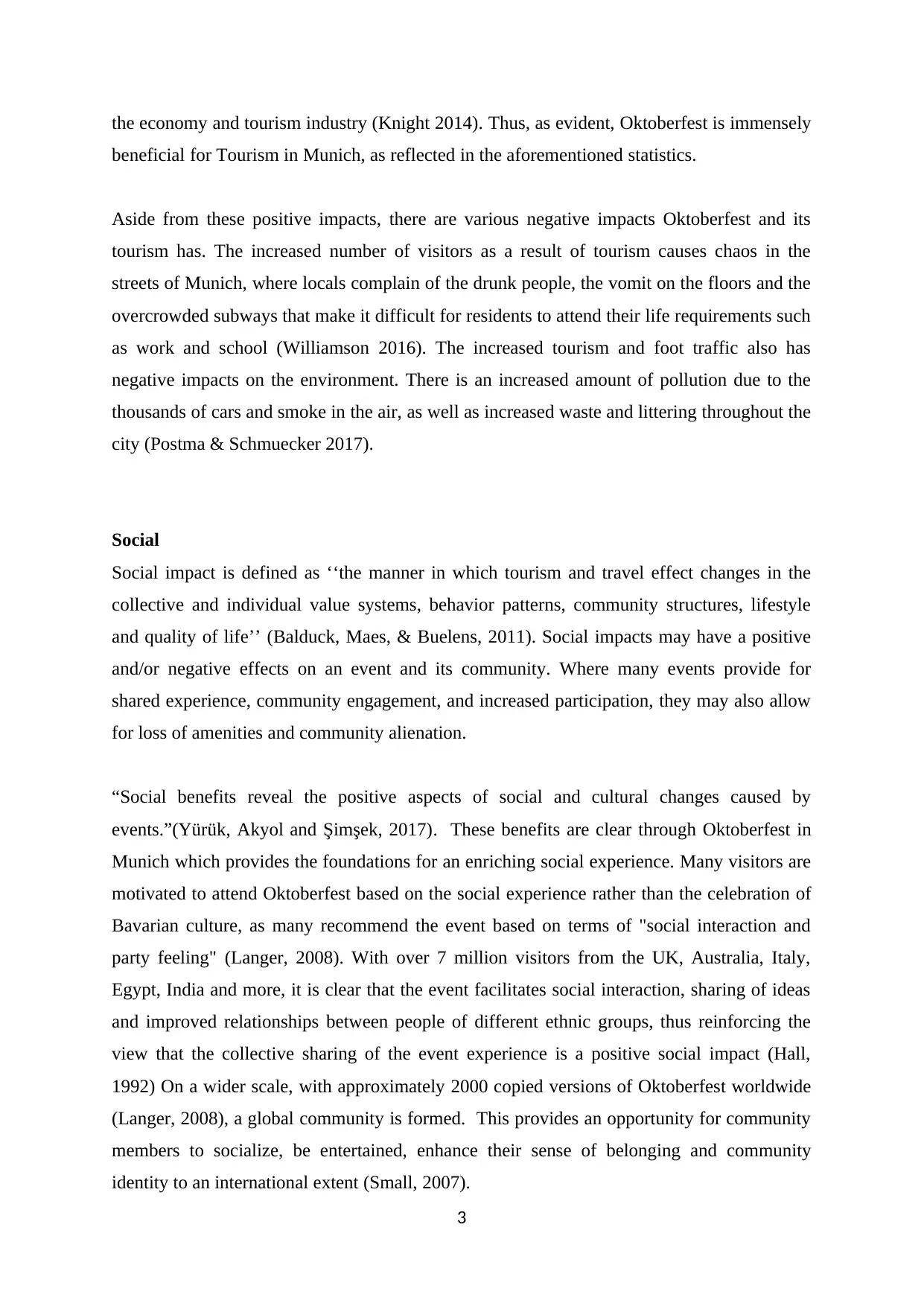
the economy and tourism industry (Knight 2014). Thus, as evident, Oktoberfest is immensely
beneficial for Tourism in Munich, as reflected in the aforementioned statistics.
Aside from these positive impacts, there are various negative impacts Oktoberfest and its
tourism has. The increased number of visitors as a result of tourism causes chaos in the
streets of Munich, where locals complain of the drunk people, the vomit on the floors and the
overcrowded subways that make it difficult for residents to attend their life requirements such
as work and school (Williamson 2016). The increased tourism and foot traffic also has
negative impacts on the environment. There is an increased amount of pollution due to the
thousands of cars and smoke in the air, as well as increased waste and littering throughout the
city (Postma & Schmuecker 2017).
Social
Social impact is defined as ‘‘the manner in which tourism and travel effect changes in the
collective and individual value systems, behavior patterns, community structures, lifestyle
and quality of life’’ (Balduck, Maes, & Buelens, 2011). Social impacts may have a positive
and/or negative effects on an event and its community. Where many events provide for
shared experience, community engagement, and increased participation, they may also allow
for loss of amenities and community alienation.
“Social benefits reveal the positive aspects of social and cultural changes caused by
events.”(Yürük, Akyol and Şimşek, 2017). These benefits are clear through Oktoberfest in
Munich which provides the foundations for an enriching social experience. Many visitors are
motivated to attend Oktoberfest based on the social experience rather than the celebration of
Bavarian culture, as many recommend the event based on terms of "social interaction and
party feeling" (Langer, 2008). With over 7 million visitors from the UK, Australia, Italy,
Egypt, India and more, it is clear that the event facilitates social interaction, sharing of ideas
and improved relationships between people of different ethnic groups, thus reinforcing the
view that the collective sharing of the event experience is a positive social impact (Hall,
1992) On a wider scale, with approximately 2000 copied versions of Oktoberfest worldwide
(Langer, 2008), a global community is formed. This provides an opportunity for community
members to socialize, be entertained, enhance their sense of belonging and community
identity to an international extent (Small, 2007).
3
beneficial for Tourism in Munich, as reflected in the aforementioned statistics.
Aside from these positive impacts, there are various negative impacts Oktoberfest and its
tourism has. The increased number of visitors as a result of tourism causes chaos in the
streets of Munich, where locals complain of the drunk people, the vomit on the floors and the
overcrowded subways that make it difficult for residents to attend their life requirements such
as work and school (Williamson 2016). The increased tourism and foot traffic also has
negative impacts on the environment. There is an increased amount of pollution due to the
thousands of cars and smoke in the air, as well as increased waste and littering throughout the
city (Postma & Schmuecker 2017).
Social
Social impact is defined as ‘‘the manner in which tourism and travel effect changes in the
collective and individual value systems, behavior patterns, community structures, lifestyle
and quality of life’’ (Balduck, Maes, & Buelens, 2011). Social impacts may have a positive
and/or negative effects on an event and its community. Where many events provide for
shared experience, community engagement, and increased participation, they may also allow
for loss of amenities and community alienation.
“Social benefits reveal the positive aspects of social and cultural changes caused by
events.”(Yürük, Akyol and Şimşek, 2017). These benefits are clear through Oktoberfest in
Munich which provides the foundations for an enriching social experience. Many visitors are
motivated to attend Oktoberfest based on the social experience rather than the celebration of
Bavarian culture, as many recommend the event based on terms of "social interaction and
party feeling" (Langer, 2008). With over 7 million visitors from the UK, Australia, Italy,
Egypt, India and more, it is clear that the event facilitates social interaction, sharing of ideas
and improved relationships between people of different ethnic groups, thus reinforcing the
view that the collective sharing of the event experience is a positive social impact (Hall,
1992) On a wider scale, with approximately 2000 copied versions of Oktoberfest worldwide
(Langer, 2008), a global community is formed. This provides an opportunity for community
members to socialize, be entertained, enhance their sense of belonging and community
identity to an international extent (Small, 2007).
3
⊘ This is a preview!⊘
Do you want full access?
Subscribe today to unlock all pages.

Trusted by 1+ million students worldwide
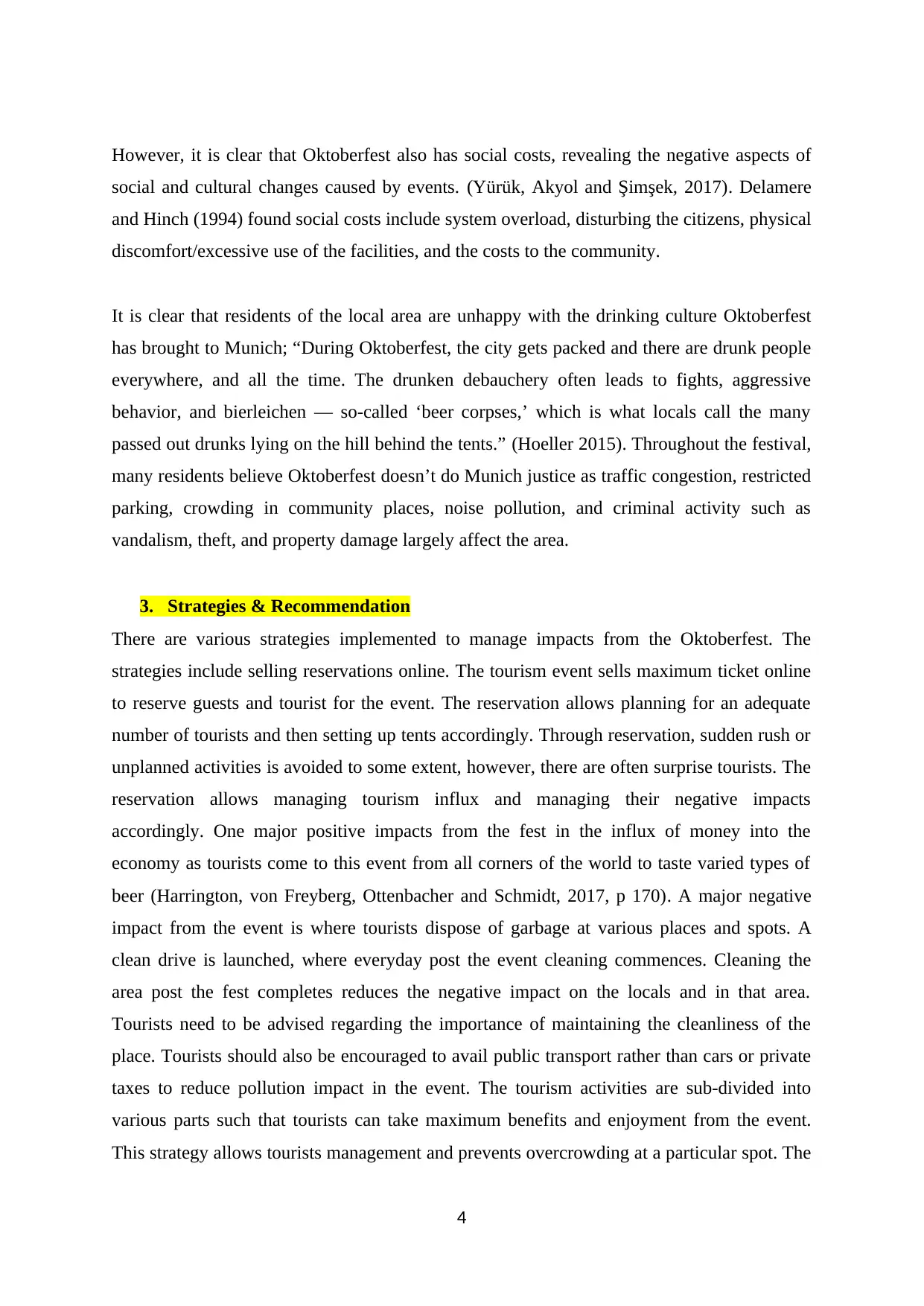
However, it is clear that Oktoberfest also has social costs, revealing the negative aspects of
social and cultural changes caused by events. (Yürük, Akyol and Şimşek, 2017). Delamere
and Hinch (1994) found social costs include system overload, disturbing the citizens, physical
discomfort/excessive use of the facilities, and the costs to the community.
It is clear that residents of the local area are unhappy with the drinking culture Oktoberfest
has brought to Munich; “During Oktoberfest, the city gets packed and there are drunk people
everywhere, and all the time. The drunken debauchery often leads to fights, aggressive
behavior, and bierleichen — so-called ‘beer corpses,’ which is what locals call the many
passed out drunks lying on the hill behind the tents.” (Hoeller 2015). Throughout the festival,
many residents believe Oktoberfest doesn’t do Munich justice as traffic congestion, restricted
parking, crowding in community places, noise pollution, and criminal activity such as
vandalism, theft, and property damage largely affect the area.
3. Strategies & Recommendation
There are various strategies implemented to manage impacts from the Oktoberfest. The
strategies include selling reservations online. The tourism event sells maximum ticket online
to reserve guests and tourist for the event. The reservation allows planning for an adequate
number of tourists and then setting up tents accordingly. Through reservation, sudden rush or
unplanned activities is avoided to some extent, however, there are often surprise tourists. The
reservation allows managing tourism influx and managing their negative impacts
accordingly. One major positive impacts from the fest in the influx of money into the
economy as tourists come to this event from all corners of the world to taste varied types of
beer (Harrington, von Freyberg, Ottenbacher and Schmidt, 2017, p 170). A major negative
impact from the event is where tourists dispose of garbage at various places and spots. A
clean drive is launched, where everyday post the event cleaning commences. Cleaning the
area post the fest completes reduces the negative impact on the locals and in that area.
Tourists need to be advised regarding the importance of maintaining the cleanliness of the
place. Tourists should also be encouraged to avail public transport rather than cars or private
taxes to reduce pollution impact in the event. The tourism activities are sub-divided into
various parts such that tourists can take maximum benefits and enjoyment from the event.
This strategy allows tourists management and prevents overcrowding at a particular spot. The
4
social and cultural changes caused by events. (Yürük, Akyol and Şimşek, 2017). Delamere
and Hinch (1994) found social costs include system overload, disturbing the citizens, physical
discomfort/excessive use of the facilities, and the costs to the community.
It is clear that residents of the local area are unhappy with the drinking culture Oktoberfest
has brought to Munich; “During Oktoberfest, the city gets packed and there are drunk people
everywhere, and all the time. The drunken debauchery often leads to fights, aggressive
behavior, and bierleichen — so-called ‘beer corpses,’ which is what locals call the many
passed out drunks lying on the hill behind the tents.” (Hoeller 2015). Throughout the festival,
many residents believe Oktoberfest doesn’t do Munich justice as traffic congestion, restricted
parking, crowding in community places, noise pollution, and criminal activity such as
vandalism, theft, and property damage largely affect the area.
3. Strategies & Recommendation
There are various strategies implemented to manage impacts from the Oktoberfest. The
strategies include selling reservations online. The tourism event sells maximum ticket online
to reserve guests and tourist for the event. The reservation allows planning for an adequate
number of tourists and then setting up tents accordingly. Through reservation, sudden rush or
unplanned activities is avoided to some extent, however, there are often surprise tourists. The
reservation allows managing tourism influx and managing their negative impacts
accordingly. One major positive impacts from the fest in the influx of money into the
economy as tourists come to this event from all corners of the world to taste varied types of
beer (Harrington, von Freyberg, Ottenbacher and Schmidt, 2017, p 170). A major negative
impact from the event is where tourists dispose of garbage at various places and spots. A
clean drive is launched, where everyday post the event cleaning commences. Cleaning the
area post the fest completes reduces the negative impact on the locals and in that area.
Tourists need to be advised regarding the importance of maintaining the cleanliness of the
place. Tourists should also be encouraged to avail public transport rather than cars or private
taxes to reduce pollution impact in the event. The tourism activities are sub-divided into
various parts such that tourists can take maximum benefits and enjoyment from the event.
This strategy allows tourists management and prevents overcrowding at a particular spot. The
4
Paraphrase This Document
Need a fresh take? Get an instant paraphrase of this document with our AI Paraphraser
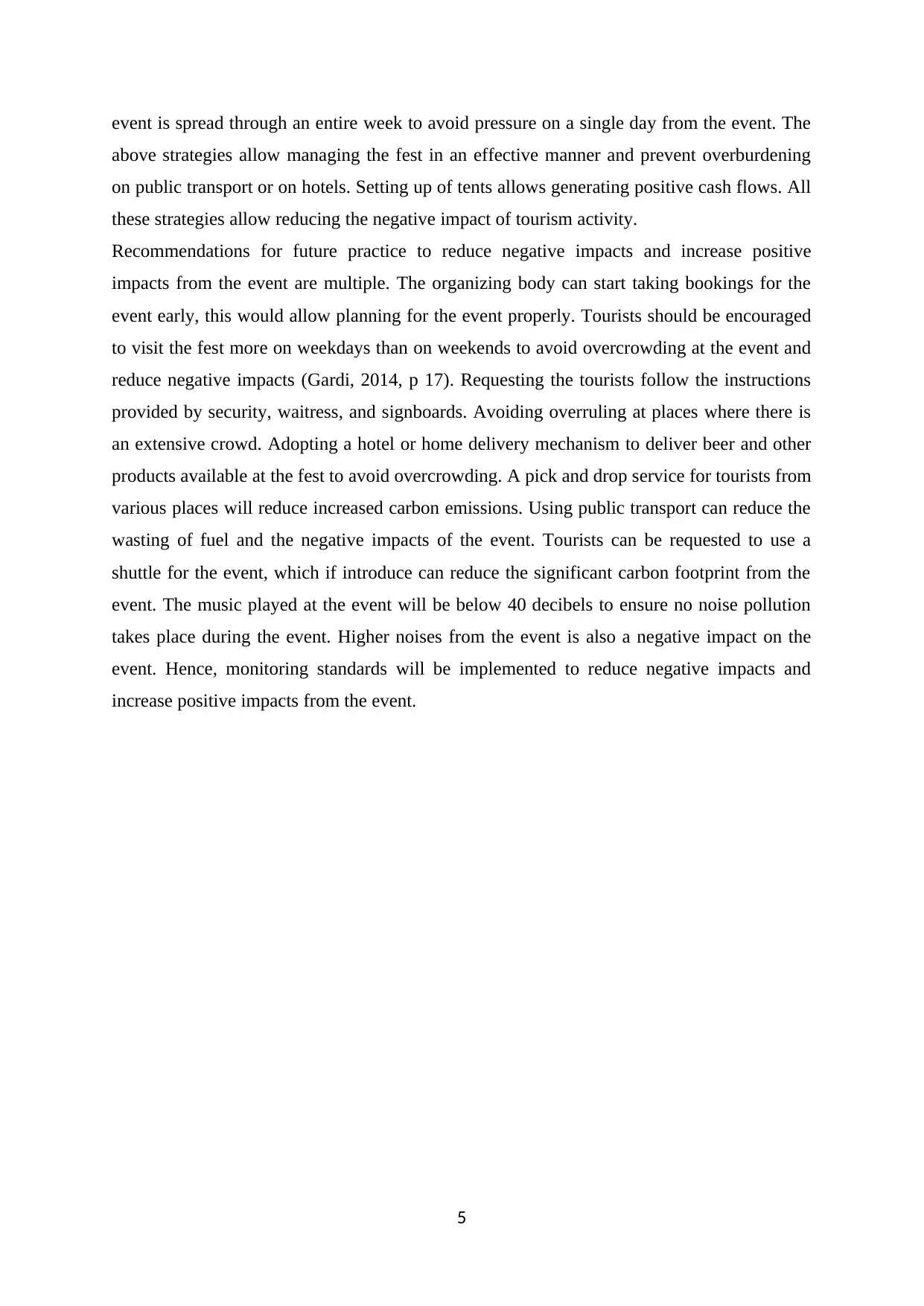
event is spread through an entire week to avoid pressure on a single day from the event. The
above strategies allow managing the fest in an effective manner and prevent overburdening
on public transport or on hotels. Setting up of tents allows generating positive cash flows. All
these strategies allow reducing the negative impact of tourism activity.
Recommendations for future practice to reduce negative impacts and increase positive
impacts from the event are multiple. The organizing body can start taking bookings for the
event early, this would allow planning for the event properly. Tourists should be encouraged
to visit the fest more on weekdays than on weekends to avoid overcrowding at the event and
reduce negative impacts (Gardi, 2014, p 17). Requesting the tourists follow the instructions
provided by security, waitress, and signboards. Avoiding overruling at places where there is
an extensive crowd. Adopting a hotel or home delivery mechanism to deliver beer and other
products available at the fest to avoid overcrowding. A pick and drop service for tourists from
various places will reduce increased carbon emissions. Using public transport can reduce the
wasting of fuel and the negative impacts of the event. Tourists can be requested to use a
shuttle for the event, which if introduce can reduce the significant carbon footprint from the
event. The music played at the event will be below 40 decibels to ensure no noise pollution
takes place during the event. Higher noises from the event is also a negative impact on the
event. Hence, monitoring standards will be implemented to reduce negative impacts and
increase positive impacts from the event.
5
above strategies allow managing the fest in an effective manner and prevent overburdening
on public transport or on hotels. Setting up of tents allows generating positive cash flows. All
these strategies allow reducing the negative impact of tourism activity.
Recommendations for future practice to reduce negative impacts and increase positive
impacts from the event are multiple. The organizing body can start taking bookings for the
event early, this would allow planning for the event properly. Tourists should be encouraged
to visit the fest more on weekdays than on weekends to avoid overcrowding at the event and
reduce negative impacts (Gardi, 2014, p 17). Requesting the tourists follow the instructions
provided by security, waitress, and signboards. Avoiding overruling at places where there is
an extensive crowd. Adopting a hotel or home delivery mechanism to deliver beer and other
products available at the fest to avoid overcrowding. A pick and drop service for tourists from
various places will reduce increased carbon emissions. Using public transport can reduce the
wasting of fuel and the negative impacts of the event. Tourists can be requested to use a
shuttle for the event, which if introduce can reduce the significant carbon footprint from the
event. The music played at the event will be below 40 decibels to ensure no noise pollution
takes place during the event. Higher noises from the event is also a negative impact on the
event. Hence, monitoring standards will be implemented to reduce negative impacts and
increase positive impacts from the event.
5
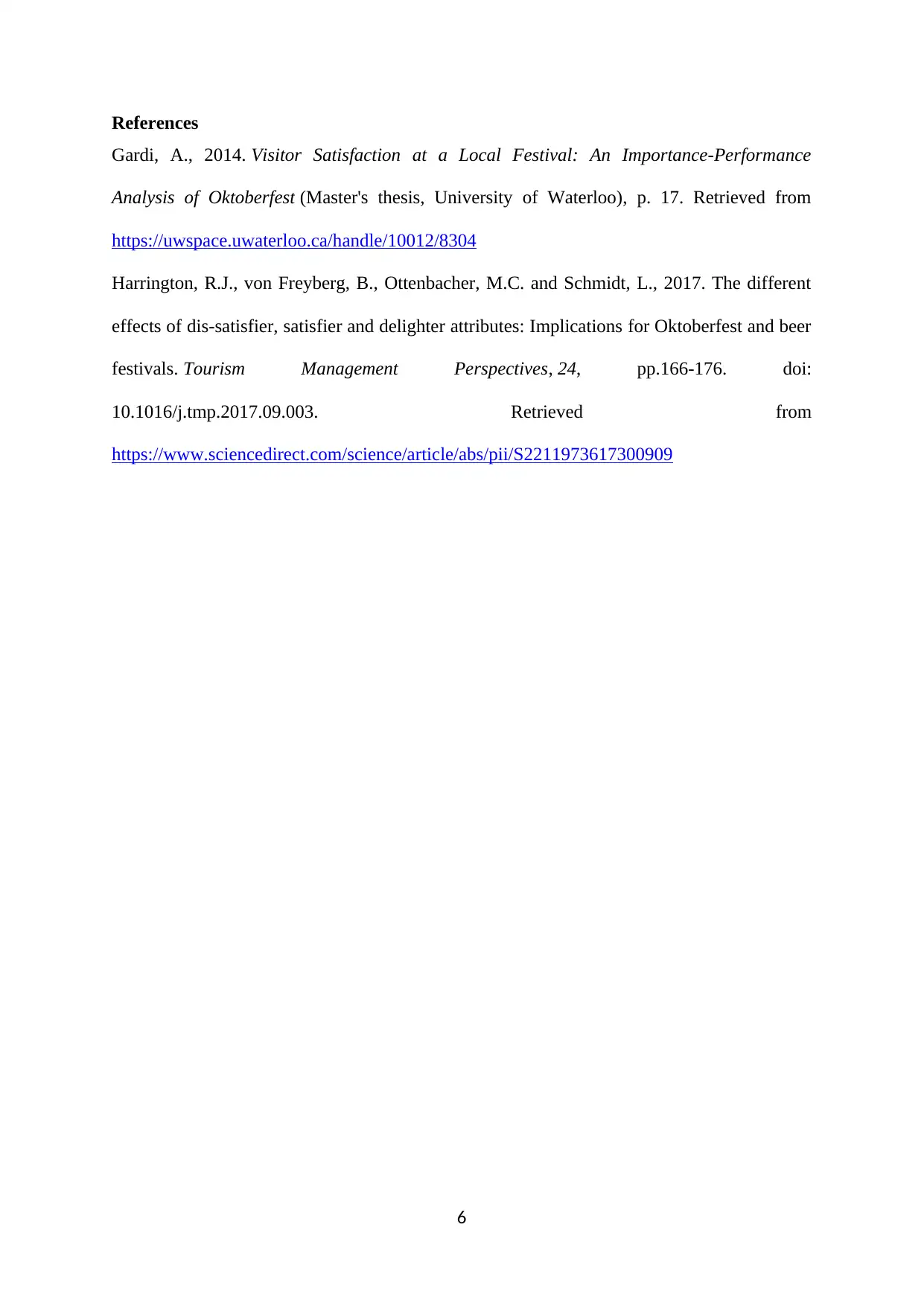
References
Gardi, A., 2014. Visitor Satisfaction at a Local Festival: An Importance-Performance
Analysis of Oktoberfest (Master's thesis, University of Waterloo), p. 17. Retrieved from
https://uwspace.uwaterloo.ca/handle/10012/8304
Harrington, R.J., von Freyberg, B., Ottenbacher, M.C. and Schmidt, L., 2017. The different
effects of dis-satisfier, satisfier and delighter attributes: Implications for Oktoberfest and beer
festivals. Tourism Management Perspectives, 24, pp.166-176. doi:
10.1016/j.tmp.2017.09.003. Retrieved from
https://www.sciencedirect.com/science/article/abs/pii/S2211973617300909
6
Gardi, A., 2014. Visitor Satisfaction at a Local Festival: An Importance-Performance
Analysis of Oktoberfest (Master's thesis, University of Waterloo), p. 17. Retrieved from
https://uwspace.uwaterloo.ca/handle/10012/8304
Harrington, R.J., von Freyberg, B., Ottenbacher, M.C. and Schmidt, L., 2017. The different
effects of dis-satisfier, satisfier and delighter attributes: Implications for Oktoberfest and beer
festivals. Tourism Management Perspectives, 24, pp.166-176. doi:
10.1016/j.tmp.2017.09.003. Retrieved from
https://www.sciencedirect.com/science/article/abs/pii/S2211973617300909
6
⊘ This is a preview!⊘
Do you want full access?
Subscribe today to unlock all pages.

Trusted by 1+ million students worldwide
1 out of 6
Related Documents
Your All-in-One AI-Powered Toolkit for Academic Success.
+13062052269
info@desklib.com
Available 24*7 on WhatsApp / Email
![[object Object]](/_next/static/media/star-bottom.7253800d.svg)
Unlock your academic potential
Copyright © 2020–2026 A2Z Services. All Rights Reserved. Developed and managed by ZUCOL.


